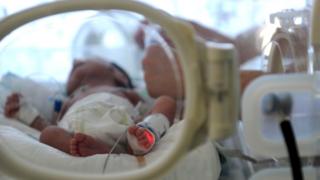waltky
Wise ol' monkey
Virus 'can cause brain damage in babies'...
Scientists say parechovirus causes brain damage in babies
Fri, 22 Apr 2016 - An investigation into an outbreak of a new virus in Australia has uncovered cases of developmental delays and brain damage in children.
Scientists say parechovirus causes brain damage in babies
Fri, 22 Apr 2016 - An investigation into an outbreak of a new virus in Australia has uncovered cases of developmental delays and brain damage in children.
A new virus can cause developmental delays and brain damage, according to research. More than 100 Australian babies were hospitalised with parechovirus in 2013 and 2014. One year later, doctors found that many of these babies had developmental problems, according to a study by the Australasian Society for Infectious Diseases (ASID). No specific treatment or vaccine is currently available.
Babies infected with the virus suffered from symptoms such as seizures, irritability and muscle twitches, according to ASID. "This is a new virus and we know very little about it. This study is helping improve our understanding of some of the long-term consequences of infection in children and the results are concerning," said ASID president Prof Cheryl Jones in a statement.

A baby in an intensive care unit
According to ASID, arechovirus was identified in Europe just over a decade ago. However, Australia recently recorded one of the world's largest outbreaks, starting in Sydney in late 2013. ASID said over 100 babies were hospitalised in Sydney alone during this outbreak, with 70% of these children suffering from neurological infection. The new study successfully followed up on 46 out of 79 of the infants, with half of them showing some developmental issues at 12 months.
Nearly 20% of the children had developed significant neurological problems. "This clearly illustrates just how vitally important it is that we follow up young infants with brain infections from this virus and remain on alert for emerging infectious diseases," Prof Jones said. "It also highlights our need to develop an adequate response. "There is currently no vaccination and no treatment for this virus. And whilst we are not anticipating a global epidemic we can certainly be confident that we will have further outbreaks in Australia," she said. The virus is spread by contact with bodily fluids such as airborne droplets of saliva, in the same way as the common cold.
Scientists say parechovirus causes brain damage in babies - BBC News